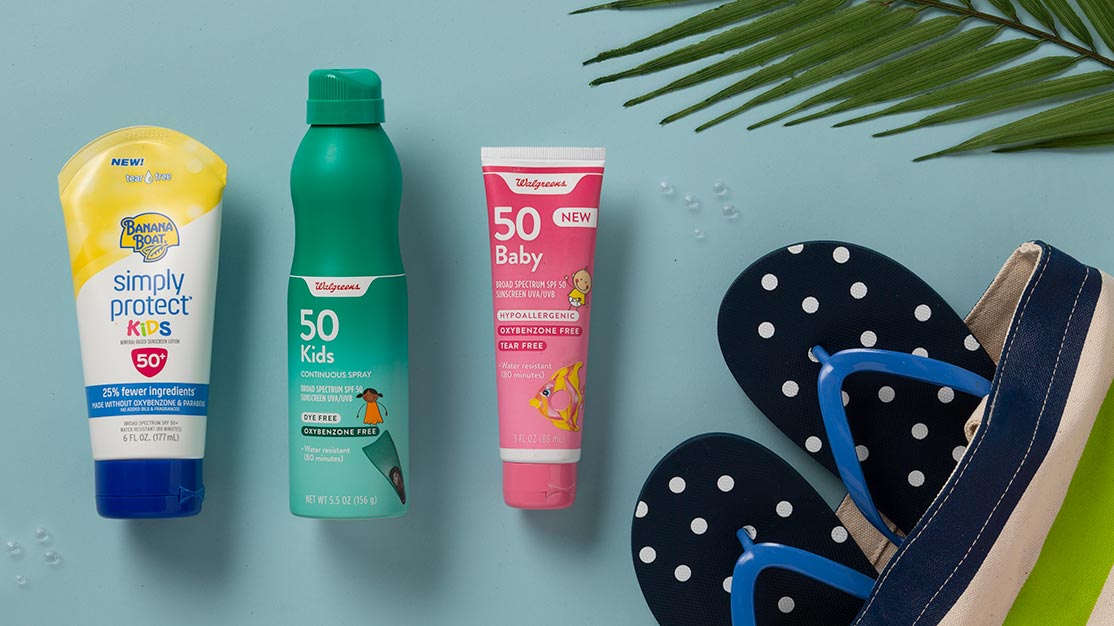Sunscreen for babies and kids

What kind of sun protection is the right choice for babies and kids?
A day at the beach or an afternoon in the yard: It's important to protect children's skin from the sun's harmful ultraviolet (UV) rays anytime they head outside. Sunscreen is for everyone in the family, including kids and babies six months of age and older.
Here's how to know what sunscreen is right for your children.
Sun protection options for babies under six months old
If you're going outside with a young infant — under six months old — most experts recommend not using sunscreen and keeping your baby out of the sun instead. Protect your little ones from the sun with these tips:
- Dress infants in lightweight, loose fitting, and long-sleeved shirts and pants that can protect them from sun. Choose a fabric that's a tighter weave rather than one that you can see through. You can look for clothing with a UV protection factor (UPF) specifically designed to offer sun protection. The higher the UPF rating, the more UV rays that are blocked. For instance, fabric with UPF 50 blocks about 98% of the sun's rays.
- Use a wide-brimmed hat and sunglasses to protect their head, face, and eyes at all times.
- Stay in the shade as much as possible, using an umbrella, sunshade, or even a stroller canopy to provide cover.
- Take other precautions to keep your baby safe. Make sure your infant drinks plenty of fluids and doesn't become overheated. Take your baby inside right away if they're extra fussy, cry inconsolably or have redness on any exposed skin.
If you cannot keep your baby under six months of age out of the sun, ask their pediatrician how to best protect them.
Sun protection for children six months and older
For children six months of age and older, it's important to use sunscreen to shield them from the sun when they go outdoors, notes the Skin Cancer Foundation. About 15-30 minutes before heading outside, apply sunscreen to cover all exposed areas on your child's skin, including hard-to-reach parts behind the ears, knees, on the neck, and scalp. Dermatologists recommend looking for sunscreens that provide these benefits:
- Broad-spectrum: Protects against both types of harmful rays: ultraviolet A (UVA) and ultraviolet B (UVB).
- Water-resistant: There's no such thing as a waterproof sunscreen, but water-resistant sunscreen works for a brief time on wet skin.
- Sun protection factor (SPF) 30 or higher: SPF 30 blocks about 97% of UVB rays, while SPF 50 blocks about 98%.
If your child has sensitive skin, look for a baby sunscreen or regular sunscreen that contains titanium dioxide or zinc oxide. These sunscreen ingredients work as a physical barrier on top of skin and may be less likely to irritate sensitive skin.
Sunscreen tips for caregivers of young children
Start with a good sunscreen routine on kids while they're young to help them understand the value of smart sun care. Here are some ideas:
- Try using a sunscreen that comes in other forms than just lotion. You can explore using appropriate SPF-rated products in sprays or sticks — as long as they're applied according to the manufacturer's directions.
- Use UPF-rated clothing and hats that block out harmful rays. Consider products like long-sleeved rash guard shirts designed for water play and tightly-woven, wide-brimmed hats.
- Try UV-blocking wrapping sunglasses to protect your child's delicate eye area. Make sure the sunglasses are the right size and don't slide down their face. Look for ones that are rated to block 100% of UV rays.
Remember that just because it's a little cloudy or even if it's overcast, you still need to use sunscreen when you head outdoors. While it may not seem sunny, up to 80% of the sun's radiation can still reach your skin. Make sun protection and sunscreen a part of your day, every day.
As always, check your sunscreen's expiration date, follow the label's directions closely, and reapply often.
Published on March 31, 2020
Sources:
https://www.fda.gov/consumers/consumer-updates/should-you-put-sunscreen-infants-not-usually
https://www.aad.org/public/diseases/skin-cancer/prevent/sun-babies
https://www.skincancer.org/skin-cancer-prevention/sun-protection/sunscreen/
https://www.aao.org/eye-health/tips-prevention/top-sunglasses-tips
https://www.skincancer.org/skin-cancer-prevention/sun-protection/sun-protective-clothing/
https://www.skincancer.org/blog/ask-the-expert-does-a-high-spf-protect-my-skin-better/
https://www.aad.org/public/everyday-care/sun-protection/sunscreen/understand-sunscreen-labels